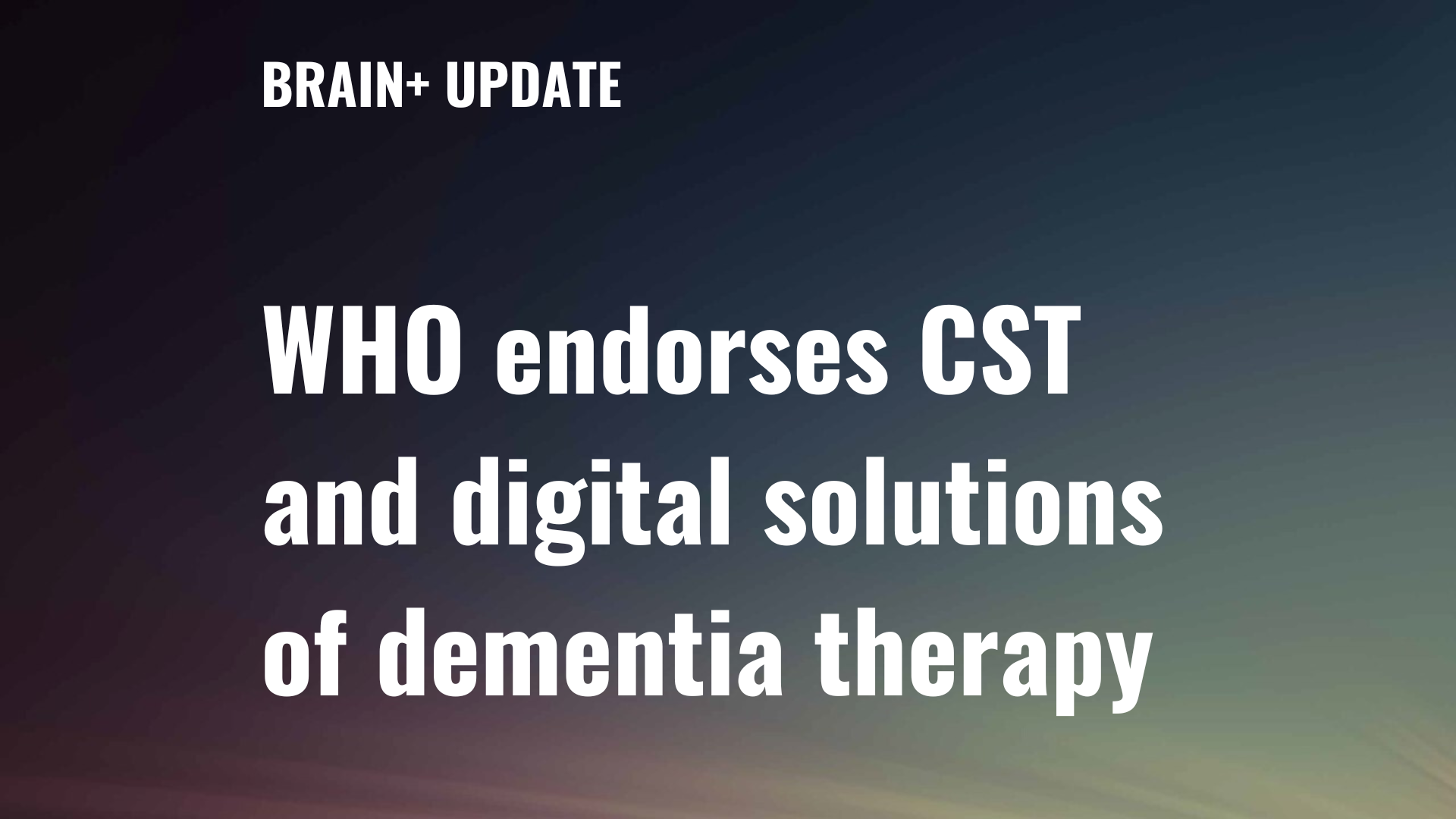
A new WHO report points to Cognitive Stimulation Therapy (CST) and digital solutions
As means to help solve the global dementia burden
- The WHO report is the second important policy paper in 2022 to have endorsed CST and digital delivery of dementia therapy, which is likely to support the adoption of such solutions, for which the addressable global market is estimated at $5bn1
- Brain+ is at the forefront of digital therapeutics for dementia and the first to have developed a digital version of CST for its upscaled and wider use and adoption
- Brain+ has recently introduced its first digital CST solution in Denmark and expects to have commercial versions ready for Germany in Q2 2023 and the UK next.
The World Health Organization (WHO) recently published a large report, A blueprint For Dementia Research, as its first initiative of this kind in the context of non-infectious diseases. In the report, WHO refers to dementia as one of the greatest health challenges of our generation and calls for increased global collaboration together with appropriate and sustainable funding to support advances across the entire dementia research spectrum, incorporating diagnostics and therapeutics as well as technological advances for more effective solutions.
Relevance of digital dementia solutions and CST endorsed by WHO
Brain+, who is a first mover in the field of digital therapeutics for dementia, is focused on the development of novel technologies and digital products to address both dementia early detection and therapy. The company’s most advanced product is a digitalized version of CST, an evidence-based non-pharmaceutical dementia therapy. The first product, CST-Therapist Companion, was released in Denmark this November and is the first in a suite of digital dementia products. Brain+ is developing digital CST in collaboration with world-leading CST experts to scale and broaden the use of the therapy, initially in Europe, and then the US and the rest of the world.
The relevance of Brain+’ work and approach is highlighted in the WHO report, which under the theme “Dementia care and support” points to both CST and the delivery of care and therapy via apps as means to help relieve the dementia burden:
“.. evidence suggests that rehabilitative interventions such as cognitive stimulation therapy, cognitive rehabilitation, physical exercise, and gait/balance training can improve cognition, function, stability, and/or the quality of life of people with dementia2. Evidence is emerging that some psychosocial interventions are effective when delivered remotely on websites, apps, and telehealth and that assistive products are valuable to promote and maintain optimal levels of functioning and independence3,4.”
WHO – A Blueprint For Dementia Research, p40
CST on the way to become a global standard for non-pharmacological treatment
Both CST and the digital delivery of dementia care have now been highlighted in two critical policy papers this year; first the World Alzheimer’s Report 2022 and latest in the WHO blueprint. This is an important recognition of the clinical relevance and long-term commercial applicability of Brain+’ digital dementia offerings and is likely also to provide support for faster adoption, as policymakers and other stakeholders adhere to the recommendations and objectives stated in the reports.
Invitation to Brain+ year-end investor webinar
Brain+ will host an investor webinar on December 22, 2022, from 16:30 to 17:00 CET to update on the company’s commercial activities and plans and give a status on product development, pipeline projects, and partnering activities.
Please register with for the webinar via the following link:
Additional reading and references:
WHO strategic goal and milestone for the theme ‘Dementia care and support’
This section shows how the WHO strategic goal and milestones criteria of success on matches the characteristics of Cognitive Stimulation Therapy (CST) on multiple parameters. Notice that CST has been highlighted as a ‘cost-effective’ intervention for long-term post-diagnostic care of people with dementia also in the World Alzheimer’s Report 2022 and that CST is characterized by tailoring and cultural adaption, as called upon by WHO. CST has also been shown to benefit the carers, another criteria mentioned in the milestone below.
Strategic goal 12: Develop affordable and cost-effective care models across the continuum of care from diagnosis to the end of life for primary care/community, long-term care, rehabilitation, hospital, and specialist settings that are appropriate for ethnic, regional, economic, and cultural contexts.
Milestone 12.1: By 2030, to have evidence-based, effective, sustainable models of community and institutional long-term care and rehabilitation programs that are tailored to populations, culturally appropriate, financially viable, account for diversity in the population, and prioritize the needs of people with dementia and their carers.
References:
Download the report here: WHO report – A Blueprint For Dementia Research
1. The DTx for dementia estimate is a subsegment estimate of the Global DTx market, estimated to reach an actual market size of USD 32.5bn in 2030 (Researchandmarkets). It is an in-house estimate of market potential based on the prevalence of dementia and Mild Cognitive Impairment and Customer Life Time Value.
2. Low L, Laver K, editors. Dementia rehabilitation: Evidence-based interventions and clinical recommendations. London: Elsevier; 2020.
3. Hopwood J, Walker N, McDonagh L, Rait G, Walters K, Iliffe S et al. Internet-based interventions aimed at supporting family caregivers of people with dementia: Systematic review. J Med Internet Res. 2018;20:e216 (doi: 10.2196/jmir.9548).
4. Laver K, Liu E, Clemson L, Davies O, Gray L, Gitlin LN et al. Does telehealth delivery of a dyadic dementia care program provide a noninferior alternative to face-to-face delivery of the same program? A randomized, controlled trial. Am J Geriatric Psychiatry. 2020;28:673–82 (doi: 10.1016/j.jagp.2020.02.009).